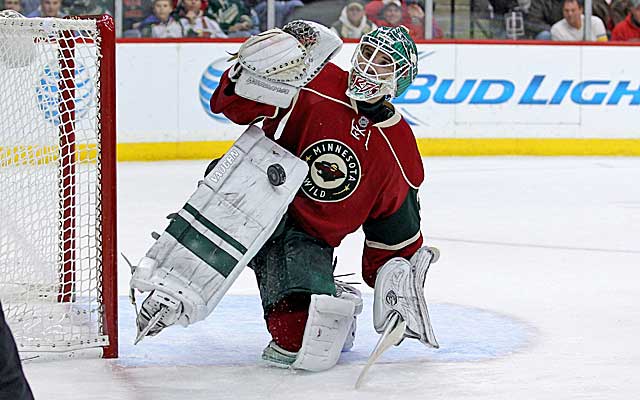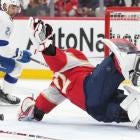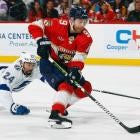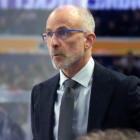
Some people can't walk because they have multiple sclerosis. Some can't talk. Suicide rates for MS sufferers are higher than average. Life expectancy is several years lower. That's what we know about MS -- Lord knows, that's what I knew about it until this week -- but there's more to learn.
His name is Josh Harding.
Harding was diagnosed last year with multiple sclerosis, but he's still playing hockey. For the Minnesota Wild.
And this season he's the best goalie in the NHL.
The story makes no sense, but it's happening and it's marvelous and it doesn't matter that Josh Harding doesn't want to talk about it. Not now, anyway. He'll talk about it in the offseason, but this is the heart of the NHL schedule, and Josh Harding doesn't identify himself at this time of year as an MS patient. He identifies himself as an NHL goalie, and if a reporter wants to talk to him about his MS, well, the reporter can wait. Because Josh Harding is too busy being the best goalie in the NHL.
Which is just so marvelous.
A story like this, it can't wait for the offseason. A story like this, it has to be told, and it has to be told now, which is when I learned about it. And this story is when lots of you, most of you would be my guess, are learning about it.
Because Josh Harding plays in the NHL, and lots of us, most of us would be my guess, don't pay close attention to the NHL. No offense to hockey, understand? But there are demands on everyone's time, real world and sports world combined, and after paying attention to baseball or football or basketball or mixed martial arts or soccer, well, there's just not enough time for lots of us, most of us would be my guess, to pay attention to hockey.
Which means we don't know the Josh Harding story, and that simply will not do. Because the Josh Harding story sounds like a miracle, and you know what's the best part?
It's not a miracle at all.
•••
Before his diagnosis of multiple sclerosis, Josh Harding was an average NHL goalie. Well, he was. He was the Wild's backup keeper, serviceable but nothing more. Nothing notable, other than his penchant for cool hockey masks, until he announced in November 2012 that he had MS.
It started the way so many diagnoses of MS start: With a young adult -- Harding was 28 -- suffering from a nauseating mixture of dizziness, fatigue and vision problems. That was Josh Harding in September 2012 when he went to a doctor, who administered an MRI that showed lesions on Harding's brain. MS was suspected immediately, and soon confirmed.
Even now, centuries after it was first discovered, MS remains a mystery. Where does it come from -- genetics or the environment? How will it attack the person who has it? What will it do to his or her life expectancy? On a case-by-case basis, doctors still can't say. They can't even agree on the biggest picture possible, the identification of the disease. Some of them call MS an auto-immune disease because of the way it attacks the central nervous system, but others prefer to call it an immune-mediated disease. What does it all mean? Basically, this: Doctors can't cure MS if they can't even pin it down.
But they can help a patient live with it. Doctors and scientists have developed several medications that have allowed MS patients to live better, longer. It's still a brutal disease to have, and over decades MS tends to rob people of the ability to walk and even talk, but doctors and medicine are pushing those outcomes farther and farther into the future.
But that kind of outcome -- that kind of treatment -- is expensive. And Josh Harding, who has fabulous NHL insurance and signed a three-year, $5.7 million contract four months before his MS diagnosis, wants to help less-fortunate MS patients with that.
"I didn't realize before I was diagnosed ... how expensive MS treatments are," Harding wrote on his charity's website, 'Harding's Hope.' "After talking to my doctors ... I realized that this is where I want to focus most of my efforts. I would like people that have MS not to worry about the decision to either take their medication or put food on the table. If I can help take away the stress of them not being able to pay their bills, I think that would help them live a more healthy and fulfilling life."
Not until 1993 was the FDA able to approve medication that could slow down the actual course of the disease. Since then a handful of medications have been approved, but the cost for one person can easily exceed $50,000 for a year, which is why Harding was all over the Midwest this offseason to raise awareness about MS, and about Harding's Hope. At one event in Minneapolis he did a TV interview and spoke in a fast, excited staccato about his plans for the evening, and the future.
"The goal of the event is for people to walk out that door knowing more about MS and knowing what Harding's Hope is about," he said. "We also want to raise awareness. We want people to know about MS -- we want that negative vibe of MS to be thrown away and know that people with MS are just like everybody else.
"We're going to raise that money to help people living with MS right now. There are struggles to be had, and the people that struggle financially, we want to help them out."
Sports Illustrated gave its annual Sportsman of the Year award to Broncos quarterback Peyton Manning. He's had a great year and he's made a great comeback and he's always been great in the community. All the same, I'm thinking Sports Illustrated could have made a better choice.
•••
Before the start of the 2012 season Josh Harding was dizzy and weak and seeing black dots, and then he was diagnosed with MS. He was on injured reserve for two months while getting his body used to the medication and then played sparingly late in the 2012 season, and not with great success. He had a 3.24 goals-against average and an .863 save percentage in five regular-season games, then a 2.94 GAA and .911 save percentage in five playoff games, and that was more than enough to win Harding the NHL's 2012 Masterton Trophy for perseverance but not enough to beat out Niklas Backstrom for the Wild's starting job. When Backstrom was injured in October, and again in November, Harding became the Wild's best option.
And the NHL's best goalie.
Medication helps. A smart plan of treatment for an MS patient -- staying rested, hydrated and as cool as possible -- helps. But all of that explains only Harding's ability to continue playing after being diagnosed with MS.
It doesn't explain why he's better than ever. And not just better than he'd played in his first eight seasons in the NHL, but better than any other NHL goalie is playing this season.
He leads the league in GAA (1.49) and shutouts (three, tied for first) and is second in save percentage (.939) and victories (17). This sort of improvement from a career backup, shaving an entire goal off his career GAA, is unexpected. To have it come from a goalie playing his first season since being diagnosed with MS?
Marvelous. But not miraculous. And that's the best part about Josh Harding's very public battle with multiple sclerosis: He is raising awareness about a disease that remains terrible -- nothing to downplay -- but is slowly being fended off by medical advances.





















